Louis Ohl
A Tutorial on Discriminative Clustering and Mutual Information
May 07, 2025Abstract:To cluster data is to separate samples into distinctive groups that should ideally have some cohesive properties. Today, numerous clustering algorithms exist, and their differences lie essentially in what can be perceived as ``cohesive properties''. Therefore, hypotheses on the nature of clusters must be set: they can be either generative or discriminative. As the last decade witnessed the impressive growth of deep clustering methods that involve neural networks to handle high-dimensional data often in a discriminative manner; we concentrate mainly on the discriminative hypotheses. In this paper, our aim is to provide an accessible historical perspective on the evolution of discriminative clustering methods and notably how the nature of assumptions of the discriminative models changed over time: from decision boundaries to invariance critics. We notably highlight how mutual information has been a historical cornerstone of the progress of (deep) discriminative clustering methods. We also show some known limitations of mutual information and how discriminative clustering methods tried to circumvent those. We then discuss the challenges that discriminative clustering faces with respect to the selection of the number of clusters. Finally, we showcase these techniques using the dedicated Python package, GemClus, that we have developed for discriminative clustering.
Discriminative Ordering Through Ensemble Consensus
May 07, 2025Abstract:Evaluating the performance of clustering models is a challenging task where the outcome depends on the definition of what constitutes a cluster. Due to this design, current existing metrics rarely handle multiple clustering models with diverse cluster definitions, nor do they comply with the integration of constraints when available. In this work, we take inspiration from consensus clustering and assume that a set of clustering models is able to uncover hidden structures in the data. We propose to construct a discriminative ordering through ensemble clustering based on the distance between the connectivity of a clustering model and the consensus matrix. We first validate the proposed method with synthetic scenarios, highlighting that the proposed score ranks the models that best match the consensus first. We then show that this simple ranking score significantly outperforms other scoring methods when comparing sets of different clustering algorithms that are not restricted to a fixed number of clusters and is compatible with clustering constraints.
Kernel KMeans clustering splits for end-to-end unsupervised decision trees
Feb 19, 2024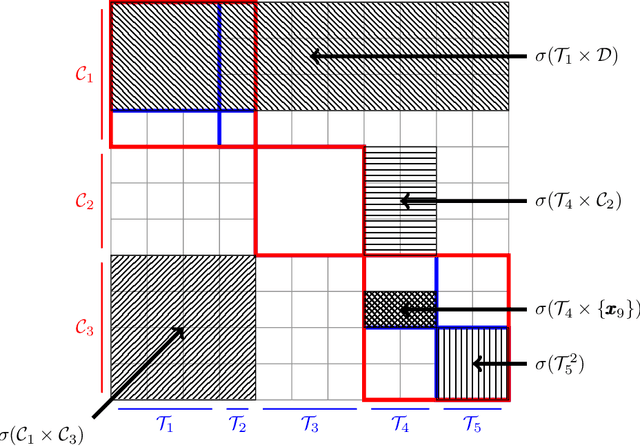
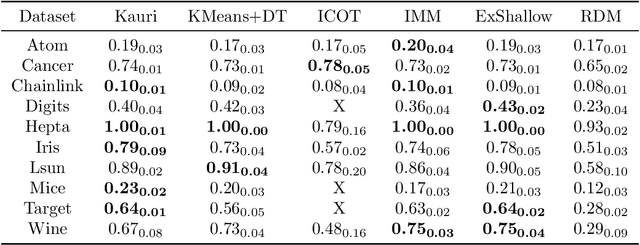
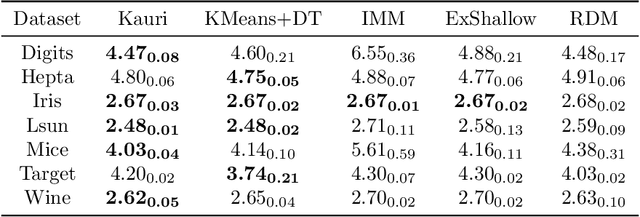

Abstract:Trees are convenient models for obtaining explainable predictions on relatively small datasets. Although there are many proposals for the end-to-end construction of such trees in supervised learning, learning a tree end-to-end for clustering without labels remains an open challenge. As most works focus on interpreting with trees the result of another clustering algorithm, we present here a novel end-to-end trained unsupervised binary tree for clustering: Kauri. This method performs a greedy maximisation of the kernel KMeans objective without requiring the definition of centroids. We compare this model on multiple datasets with recent unsupervised trees and show that Kauri performs identically when using a linear kernel. For other kernels, Kauri often outperforms the concatenation of kernel KMeans and a CART decision tree.
Generalised Mutual Information: a Framework for Discriminative Clustering
Sep 06, 2023



Abstract:In the last decade, recent successes in deep clustering majorly involved the Mutual Information (MI) as an unsupervised objective for training neural networks with increasing regularisations. While the quality of the regularisations have been largely discussed for improvements, little attention has been dedicated to the relevance of MI as a clustering objective. In this paper, we first highlight how the maximisation of MI does not lead to satisfying clusters. We identified the Kullback-Leibler divergence as the main reason of this behaviour. Hence, we generalise the mutual information by changing its core distance, introducing the Generalised Mutual Information (GEMINI): a set of metrics for unsupervised neural network training. Unlike MI, some GEMINIs do not require regularisations when training as they are geometry-aware thanks to distances or kernels in the data space. Finally, we highlight that GEMINIs can automatically select a relevant number of clusters, a property that has been little studied in deep discriminative clustering context where the number of clusters is a priori unknown.
Sparse GEMINI for Joint Discriminative Clustering and Feature Selection
Feb 07, 2023Abstract:Feature selection in clustering is a hard task which involves simultaneously the discovery of relevant clusters as well as relevant variables with respect to these clusters. While feature selection algorithms are often model-based through optimised model selection or strong assumptions on $p(\pmb{x})$, we introduce a discriminative clustering model trying to maximise a geometry-aware generalisation of the mutual information called GEMINI with a simple $\ell_1$ penalty: the Sparse GEMINI. This algorithm avoids the burden of combinatorial feature subset exploration and is easily scalable to high-dimensional data and large amounts of samples while only designing a clustering model $p_\theta(y|\pmb{x})$. We demonstrate the performances of Sparse GEMINI on synthetic datasets as well as large-scale datasets. Our results show that Sparse GEMINI is a competitive algorithm and has the ability to select relevant subsets of variables with respect to the clustering without using relevance criteria or prior hypotheses.
Generalised Mutual Information for Discriminative Clustering
Oct 14, 2022
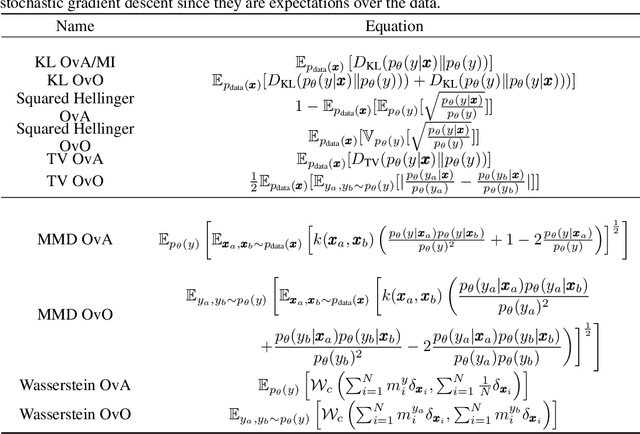

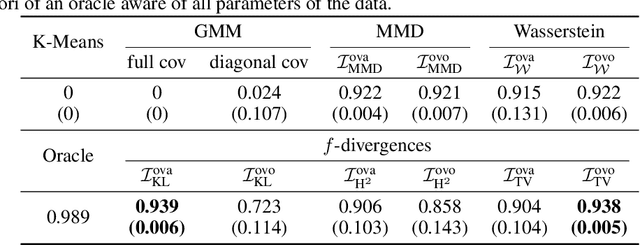
Abstract:In the last decade, recent successes in deep clustering majorly involved the mutual information (MI) as an unsupervised objective for training neural networks with increasing regularisations. While the quality of the regularisations have been largely discussed for improvements, little attention has been dedicated to the relevance of MI as a clustering objective. In this paper, we first highlight how the maximisation of MI does not lead to satisfying clusters. We identified the Kullback-Leibler divergence as the main reason of this behaviour. Hence, we generalise the mutual information by changing its core distance, introducing the generalised mutual information (GEMINI): a set of metrics for unsupervised neural network training. Unlike MI, some GEMINIs do not require regularisations when training. Some of these metrics are geometry-aware thanks to distances or kernels in the data space. Finally, we highlight that GEMINIs can automatically select a relevant number of clusters, a property that has been little studied in deep clustering context where the number of clusters is a priori unknown.
 Add to Chrome
Add to Chrome Add to Firefox
Add to Firefox Add to Edge
Add to Edge